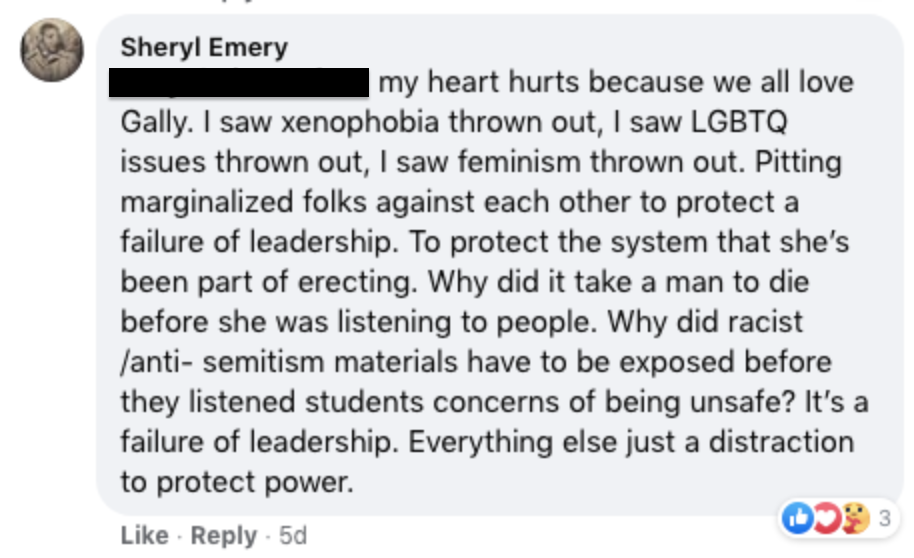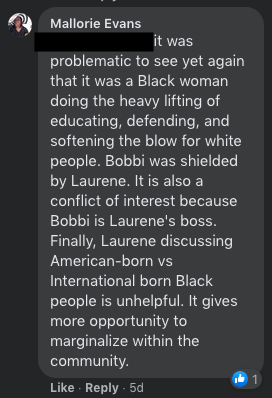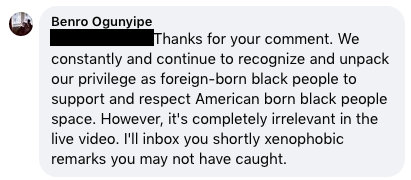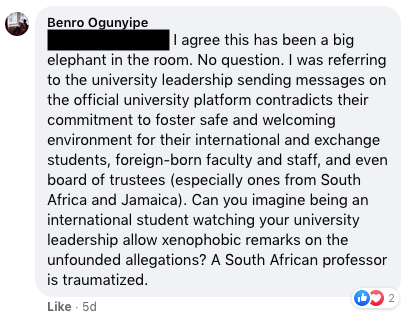Disclosure: Although all are welcome to read this piece, this was primarily put together for our white Deaf and hard of hearing readers. It is an opportunity for you to read and learn from a few Black Deaf community leaders and members’ publicly posted input in response to Gallaudet University’s live-streamed discussion between Dr. Laurene Simms and President Cordano. I have white privilege, and I am a trans nonbinary deaf person who was born in the United States. Like a lot of you, my initial reaction to the conversation was emotional. The emotions I was feeling blocked my ability to be objective as I typed and corrected the video transcript (available here). I had to take a step back, look up posts and comments on Facebook from Black Deaf community members, watch the video 1-2 more times, and read the transcript 1-2 more times. Only after that was I able to better understand the full picture of what happened in the conversation from the perspective of a Black Deaf person. Please keep in mind that the public input shown below is a limited, small part of the several different opinions of diverse Black Deaf people.
While my business partner Mary Pat Luetke-Stahlman is the face of Deaf Vee Journal, I still put this together on my own. This is strictly focused on the language used, the choice of words, in how it framed the discussion. Just like any other work I have posted on Deaf Vee Journal, I openly welcome feedback, including criticism and questions, on this piece. You can send an e-mail to deafveejournal@gmail.com, write a direct message to Deaf Vee on Facebook, or type in a search for “Piper Collins” on Facebook and message me directly from there. I have access to feedback for all three of them.
It might seem somewhat odd at first for you to see that this piece is broken down in three main parts by category. I’m hoping that when you get to the end, the organization itself will make sense. And, yes, the contract is mentioned.
The Erasure of President Cordano’s Whiteness
In the conversation, Dr. Simms identifies as Black herself, President Robert Davila was described as a Latino man, and all other Presidents were recognized as white. The race status of everyone involved is mentioned except for three women: Elisabeth Zinster, Jane Fernandes, and Roberta Cordano. If you review the video/transcript and count the number of times that President Cordano is described as a “woman, Deaf, queer,” it is five times. The phrase “white man” was mentioned at least ten times. Why is that? It has the effect of erasing President Cordano’s whiteness, as if her whiteness is invisible, and this is a problem.
Look at what Sheryl Emery says: the argument that President Cordano should stay because she is a woman, Deaf, and queer is “pitting marginalized folks against each other to protect a failure of leadership.” Emery’s comment also has additional valid points of criticism. Other Black Deaf folks have made similar commentary in that the conversation pitted marginalized groups against each other.

While it is true that President Cordano is a woman and openly lesbian, it does not diminish her white privilege.
When you look at women, white women have it better than Black women do. White Deaf people have had more access to education, jobs, and other opportunities compared to Black Deaf people. I highly encourage you to watch David Player’s interview on Melmira and read the great article he wrote on white Deaf privilege. There is an ASL version with captions available for Player’s article. What about the LGBTQ+ communities? White people with LGBTQ+ identities are more likely to receive preferential treatment and have an easier time accessing resources compared to Black people with LGBTQ+ identities. This is most especially true for White trans/nonbinary people compared to Black trans/nonbinary people. White privilege is alive and well among the minority groups of women, the Deaf* communities, and the LGBTQ+ communities.
The white Deaf lesbian woman faces sexism from the White man, audism from hearing people, and heterosexism from straight people, yes. But do not allow this to distract you from acknowledging that the live-streamed conversation was about RACISM. Systemic and institutional racism.

President Cordano still has white privilege in all three minority groups (a white woman, a white Deaf person, and a white queer person). Period. President Cordano can be racist to Black women, racist to Black Deaf people, and racist to Black folks who identify as queer. Mallorie Evans’ comment is a great example of how President Cordano’s white fragility was readily apparent. I have witnessed quite a few Black Deaf community members stating they feel that tokenism occurred.
The erasure of President Cordano’s whiteness in her demographic description during this conversation is an attempt to excuse her from the moral and ethical responsibility she has in looking at how her whiteness has influenced her decision-making process in leadership (or lack thereof) at Gallaudet University. It lessens the accountability President Cordano owes to prospective, current, and former Black Deaf students, faculty, staff, and Board of Trustee members.
In one of Ashanti Monts-Tréviska’s vlogs, they stress how important it is for Black Deaf community members not to give in to the comfort of white people. It is 50 minutes long, but it is well worth watching, I promise! A transcript will be available soon for their vlog, and I will update you when one has been added.
Xenophobia
While there are some differences in the life experiences of American-born Blacks and international-born Blacks, Benro Ogunyipe emphasizes it is completely irrelevant to the live video discussion about systemic racism on campus.

The allowance of xenophobic comments on a public platform for all to see was also a failure of leadership on President Cordano’s part.
One part of the conversation, in particular, affirmed that whether the Black person is American-born or international-born does not have any bearing in how law enforcement treats the Black person: “Cops look at us the same.” Gallaudet University’s Department of Public Safety personnel subjects both American-born and international-born Black students to police brutality just the same by the color of their skin. I do want to make it clear here that it is a real possibility that DPS personnel have also made xenophobic comments to international-born Black students and, in that case, both racism and xenophobia must be addressed. It’s the same concept with White faculty and staff in respect to misconduct in the classroom with international-born and American-born Black students, and it is applicable to other situations. The issue of systemic racism affects all Black people on campus, American-born or international-born.

An Important Message
Once you have had some time to process the perspectives of some Black Deaf community leaders and members shown here when it comes to the live-streamed conversation between Dr. Laurene Simms and President Cordano, consider this message from an anonymous inside source that Deaf Vee Journal received.
The message opens with this: “What no one is currently talking about is the fact that Bobbi’s contract as President is due to expire. Her contract is for six years, and it expires on December 31, 2021.”
We did verify the length of President Cordano’s contract with a search of the history with Gallaudet University’s Presidential Search Committee. In light of the continuing institutional and systemic racism on campus with President Cordano’s repetitive history of missed opportunities to satisfactorily address it, now is the ideal time to re-evaluate her abilities in leadership as President.
Why does this discussion need to happen now? Deaf People wrote that the search process for the University President position “took a year, led by a committee representing a cross-section of the campus community, in tandem with Bridge Partners, a consulting firm.”
As President Cordano’s contract expires on December 31, 2021, and it takes a year to find a new University President, the Board of Trustees would need to have a Presidential Search Committee set up and ready to go by late November or early December of this year. Given all this, in addition to the Board of Trustees’ June 18, 2020 response to the National Black Deaf Advocates [NBDA]’s open letter, there are one of two possible scenarios.
Scenario #1: It is quite likely that the Board of Trustees has already made a decision. But what is it?
Scenario #2: If the Board of Trustees has not yet decided, this could be the perfect scenario for an exit plan that works out for both Gallaudet University and the NBDA without tarnishing anybody’s reputation or creating a bad public relations image for Gallaudet University. Under this exit plan, the Board of Trustees would not renew President Cordano’s contract instead of having to push her out.
The anonymous source stated that as of right now, there is no effort being made to form a new President Search Committee nor is there any mention of President Cordano’s expiration date for her contract. It is the source’s observation that Scenario #1 is more likely and that, due to the ill-timing of this situation with President Cordano being in hot water, nobody wants to talk about it: “Shouldn’t this be what everyone is talking about right now? The timing seems perfect, yet no one is.”





